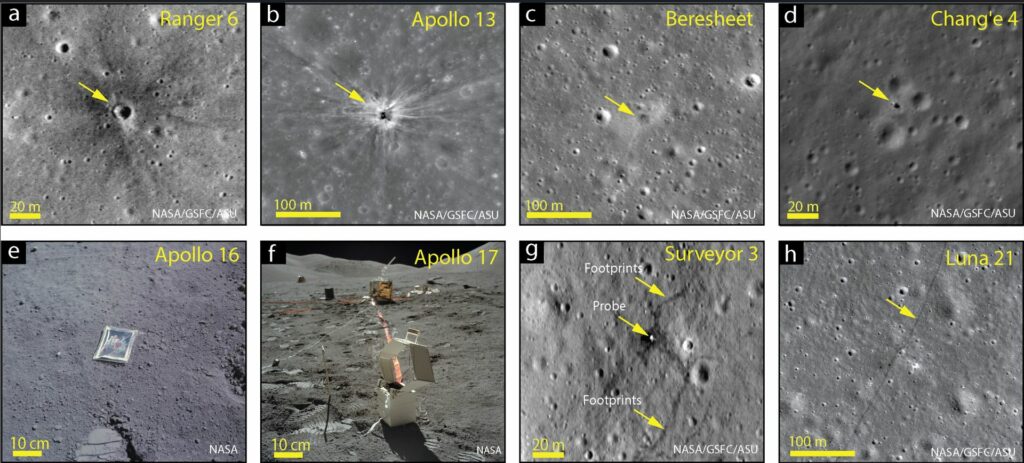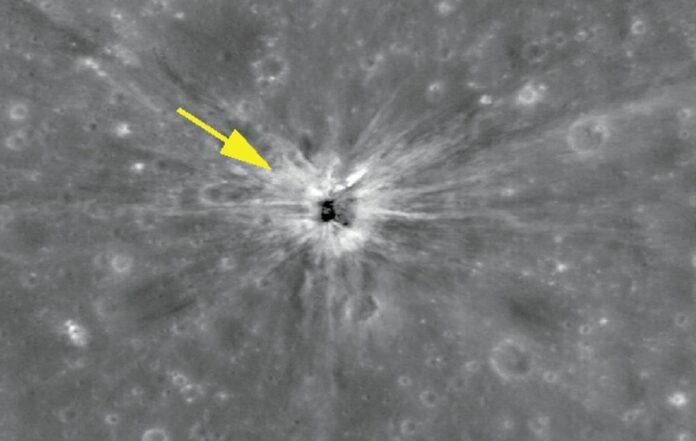The University of Kansas scientists make a bold leap in lunar history, claiming in Nature Geoscience that human influence has spawned a new moon epoch, the Lunar Anthropocene, possibly starting with the 1959 Luna 2 mission.
Human activity first disturbed the lunar landscape on September 13, 1959, with the landing of the USSR’s Luna 2, an unmanned spacecraft.
Since then, over a hundred missions, both manned and unmanned, have made contact with the moon, through landings and crashes alike.
Among these, NASA’s Apollo Lunar Modules stand out, having famously ferried astronauts to the lunar surface, captivating people worldwide.
Looking ahead, planned missions are set to alter the moon’s appearance even more drastically. Researchers from the University of Kansas, including anthropologists and geologists, now suggest that it’s time to recognize humanity’s growing influence on the moon. They propose that a new geological epoch for the moon, the Lunar Anthropocene, has begun.
As detailed in a commentary published today in Nature Geoscience, these scientists posit that this epoch might have started as early as 1959 with Luna 2’s arrival.
Justin Holcomb, a postdoctoral researcher at the Kansas Geological Survey at the University of Kansas and the lead author of the study, compares this concept to the Anthropocene on Earth.
According to the researcher, just as humans have significantly impacted Earth, leading to discussions of the Anthropocene starting potentially hundreds of thousands of years ago or around the 1950s, “the Lunar Anthropocene already has commenced.”
The goal, Holcomb emphasizes, is to “prevent massive damage or a delay of its recognition until we can measure a significant lunar halo caused by human activities, which would be too late.”
Holcomb worked alongside Rolfe Mandel, a University Distinguished Professor of Anthropology, and Karl Wegmann, an associate professor specializing in marine, earth, and atmospheric sciences at North Carolina State University, on this groundbreaking paper.

He expressed hope that the idea of the Lunar Anthropocene would challenge the common belief that the moon remains static and mostly unaffected by human activities.
Holcomb noted:
“Cultural processes are starting to outstrip the natural background of geological processes on the moon.
“These processes involve moving sediments, which we refer to as ‘regolith,’ on the moon. Typically, these processes include meteoroid impacts and mass movement events, among others. However, when we consider the impact of rovers, landers and human movement, they significantly disturb the regolith.
“In the context of the new space race, the lunar landscape will be entirely different in 50 years. Multiple countries will be present, leading to numerous challenges. Our goal is to dispel the lunar-static myth and emphasize the importance of our impact, not only in the past but ongoing and in the future. We aim to initiate discussions about our impact on the lunar surface before it’s too late.”
The paper points out the lack of “Leave No Trace” principles on the moon, which many nature enthusiasts practice on Earth. The moon has accumulated various human-made debris from past missions, including remnants of spacecraft, bags of human waste, scientific instruments, and other items like flags, golf balls, and religious texts.
The authors wrote, “We know that while the Moon does not have an atmosphere or magnetosphere, it does have a delicate exosphere composed of dust and gas, as well as ice inside permanently shadowed areas, and both are susceptible to exhaust gas propagation. “Future missions must consider mitigating deleterious effects on lunar environments.”
Holcomb and his team are leveraging the concept of the Lunar Anthropocene not only to underscore the potential adverse effects of human activity on the moon but also to bring attention to the unprotected historical and anthropological sites on the lunar surface.
Holcomb emphasized, “A recurring theme in our work is the significance of lunar material and footprints on the moon as valuable resources, akin to an archaeological record that we’re committed to preserving. The concept of a Lunar Anthropocene aims to raise awareness and contemplation regarding our impact on the lunar surface, as well as our influence on the preservation of historical artifacts.”
At KU, Holcomb and his colleagues are exploring the emerging field of ‘space heritage,’ which involves the preservation and documentation of items such as lunar rovers, flags, golf balls, and footprints on the moon.
Holcomb added, “As archaeologists, we perceive footprints on the moon as an extension of humanity’s journey out of Africa, a pivotal milestone in our species’ existence. These imprints are intertwined with the overarching narrative of evolution. It’s within this framework we seek to capture the interest of not only planetary scientists but also archaeologists and anthropologists who may not typically engage in discussions about planetary science.”
Image Credit: Holcomb et al
